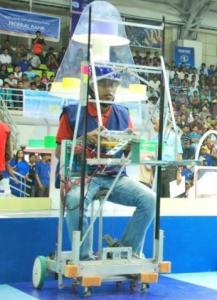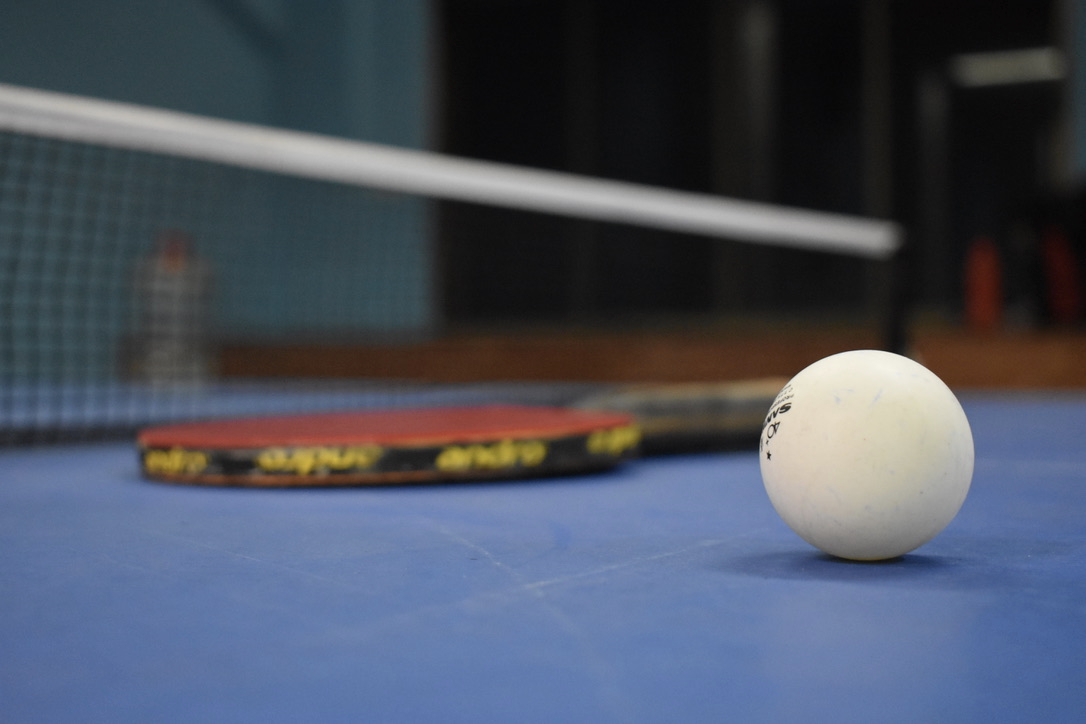 Nestled in its quiet, green surroundings, the Centre For Innovation is a haven for tech-enthusiasts in the campus. While this serene facility exudes a sleepy air in the morning, it truly comes alive in the night, buzzing with activity as student teams work hard on different projects till the wee hours of the morning.
Nestled in its quiet, green surroundings, the Centre For Innovation is a haven for tech-enthusiasts in the campus. While this serene facility exudes a sleepy air in the morning, it truly comes alive in the night, buzzing with activity as student teams work hard on different projects till the wee hours of the morning.
CFI, (or ‘C-Phi’, as we pronounce it) was envisioned as a forum for the creative output of engineers-in-the-making at IITM. CFI clubs are groups of students who are united by an enthusiasm about a particular field of technology and a wish to gain expertise in it. These clubs are a medium for the exchange of knowledge and ideas among students; juniors and seniors interact and work together here, keeping keep the enthusiasm alive across batches of students. There are eight CFI clubs, which work on diverse projects and cater to the varying interests of students at IIT Madras.
Aero Club

The Aero Club, started in 2006-07, is an informal group of around 25 people who are enthusiastic about anything that flies, ranging from Chuck Gliders to Hovercrafts. Their interest in aeroplanes is reflected in the projects they’ve taken up, such as the delta-wing aircraft, tilt-rotor aircraft, push-propeller aircraft, micro aerial vehicle etc. Other notable projects done by this club include an ornithopter and the Want-to-Fly series (for flight stabilization and automation), which were covered in major newspapers.
Club members have been major contributors to IARC, one of the world’s toughest robotics competitions. This year, they are among the 10 teams in India to have qualified, amidst competition from aerospace giants such as DRDO and ADA, to participate in a micro-aerial vehicle competition organised by National Aerospace Laboratories. These activities apart, the Aero Club has conducted a Chuck Glider workshop or Small Plastic Airplane Design workshop (SPAD) for students of IIT Madras. It is also responsible for conducting the Shaastra Airshow.
Astronomy Club

The Astronomy Club unites stargazers across IITM. Members say that the history of the Astronomy Club is uncertain. While they haven’t heard of the club being functional before 2004, some professors maintain that they were a part of the club even when they were studying in IIT Madras, and that the present version of the club is just a reincarnation of an older club. The Astro Club was brought under the umbrella of CFI Clubs last year, before which it had functioned independently.
Most activities of the club are conducted on the rooftops of the HSB building under starry skies. The club conducts regular theory sessions on astronomy and observes celestial phenomena using its 8’’ optical telescope.
Apart from the usual theory and observation sessions, a trip to Ramanchery, a remote village, was organized last year to engage in astrophotography with Dr. Suresh Mohan, an eminent doctor cum astro-photographer based in Chennai. Moreover, an eclipse and the transit of Venus was watched during the last summer. Next year, they plan to build a radio telescope, to enable observation in the day-time. One of the Club Heads quips, “If our stars align perfectly, we might end up starting astro-photography.”
3D Animation Club


The 3-D Animation Club was founded in October 2011. The club’s aim is to enable its members to visualize projects through 3D models, as well as teach members the theoretical aspects behind these models.
The works of this club are beautiful. Perhaps the most iconic of them is the 3D model of Gajendra Circle shown in the picture. Some of their other 3-D models are shown in the figure below. This club not only models inanimate objects but brings them to life as well, as can be seen in this animation of the Shaastra robot.
All one needs to be a part of this club is a laptop with the Blender Engine installed on it. This club undertakes numerous summer projects, such as making attractive short animation films and simulating games. The main takeaway in being a part of this club is learning to code the fun way, that is, through animation.
Auto Club
The Auto Club, which has grown to include 60 members in a span of 3 years, has certainly made its presence felt in campus. Members of the club can join teams participating in various competitions, learn automobile design and engineering and work on various projects to face the challenges the field has to offer. The club organizes introductory lecture sessions for aspiring members. Last year, a 10-day workshop was organized during the winter to enthuse and teach juniors about 3D modelling and the various subsystems of an automobile.

In 2011, ‘Team Raftar’ was born out of the Auto Club. The team’s name which reads as ‘rough tar’ might mislead you into thinking that the team’s condition is similar to that of Chennai’s roads, but its good run at FSAE 2012 will convince you otherwise. A team was also formed last year to participate in Shell-Eco Marathon, a competition aimed at building a car with high mileage. Apart from this, work on a hybrid city commute bike was started last year. Freshers joining this year have the opportunity to continue work on last year’s projects and contribute to new projects.
This group of automobile enthusiasts is unique in that it sees more participation from the PG members of the Institute than the other clubs, and as a result, has access to more sophisticated laboratory facilities.
Computer Vision Group

The idea of a computer vision group for IIT Madras was seeded when IIT Madras participated in IARC in 2010. A need for students with expertise in this field was noted, which the club seeks to fulfill. With a set of extremely dedicated and motivated members, knowledge transfer from the senior members of the group to the juniors happens systematically through regular meetings, teaching sessions and hack nights.
The CVG prides itself in its work environment. According to the Club Head, “We believe in the idea of an ideal work environment where students come punctually to work meetings and utilize the time spent in the club to the fullest. The suggestions given by seniors and group members at work are invaluable.”

This is the only CFI Club to take up industrial consultancy projects and bring their technology to the product stage. In an initiative of social relevance, they have created a low-cost OMR reader to support the scholarship program of the NGO Pravinya. Ongoing consultancy projects in this group include developing a low cost device to find the stagger of the pantograph of electric trains and developing an algorithm to estimate the volume of latex produced by a tree from the image of the cup. Another popular project done by this group is the augmented reality project which was displayed during Shaastra last year. The Computer Vision Group is also a major contributor to IARC. Next year, they plan to incorporate new hardware in the domain of computer vision like the Google Glass, Leap Motion and Kinect.

iBot Club
Formed in 2008, the club aims to raise the level of robotics in the Institute to an international standard. Robotics being a universal hobby, this club has seen participation from students across several branches, and has over 300 members.


iBot has traditionally had a large number of activities organised for freshers. ‘Gold Rush‘, a competition meant to teach freshers autonomous robotics, saw widespread participation last semester. iBot also conducts workshops on topics like SolidWorks, PCB design, and manual robotics. It encourages its members to take up advanced projects to broaden their knowledge base. A total of thirteen projects were taken up by the club this year. Successful projects in the past include the Robo-Fish, a smart navigator, a remote-controlled ball etc.

The club sends teams to, and has won accolades in, competitions such as Robocon, FIRA, IARC and DRDO SRC. Some of its memorable achievements include the Robocon team winning the nationals in 2009, the Robocon team being awarded the Green Planet award this year, the DRDO SRC team winning the second place in 2008, and the IARC team being acknowledged as the best image processing team when it participated in 2010. The iBot Club strives not only to inspire students to explore their engineering skills through robotics, but also teaches them teamwork and leadership.
Electronics Club
The Electronics Club was started in January 2012 to enthuse students about electronics and to bridge the gap between theory and practice in this field. It is a platform for all electronics geeks of the Institute to seek help and exchange ideas and knowledge.
The club organises several fundae sessions for its 60-odd members, which are often followed up by hands-on sessions. The club has conducted microcontroller coding sessions in the Integrated Electronics Lab of the EE department.

Although the club is in its infancy, senior club members have participated in prestigious competitions like the TI Analog Design Challenge and the Schneider Electric Challenge. Starting from the next year, the club plans to expand its operations by appointing coordinators, conducting more hands-on sessions and taking up mini-projects.
WebOps Club
The one-year-old Web Operations Club aims to become a hub for insti’s web developers. It was created to help direct students with an interest in web development. It holds interactive sessions to enable students to become good web developers and help with institute web operations. To create a hacker culture in IITM, a few open projects were attempted last year and some overnight hack-sessions conducted.
The club is mentored by developers who have contributed to web development operations in the institute. It plans to develop a WebOps Club website to provide free online tutorials and a framework for club members to host their work online.


